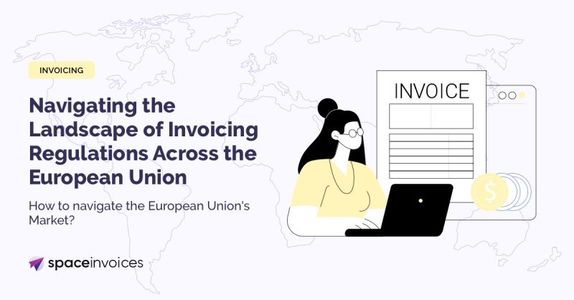Navigating the Landscape of Invoicing Regulations Across the European Union
Despite common rules, the devil, as they say, is in the details. Some EU countries have additional requirements that businesses must be aware of when issuing invoices.
The European Union (EU) is a single market and customs union, but when it comes to invoicing regulations, businesses must navigate a complex patchwork of individual national laws. Each member state has the autonomy to implement the EU’s VAT Directive in ways that align with their local conditions, which can lead to a significant variance in invoicing rules across the bloc. This article will provide an overview of the general rules of invoicing across different EU countries, the segregation in rules, and the requirement for fiscalization and real-time reporting in some jurisdictions.
The Common Ground: EU Invoicing Rules
As a starting point, all EU member states adhere to the basic rules set out in the EU’s VAT Directive. These rules stipulate that businesses must issue an invoice for goods or services they sell, that these invoices must contain certain basic information, and that they should be stored for a certain period (usually five years).
The basic information that must be included on all invoices within the EU includes:
The Variance: National Invoicing Regulations
Despite these common rules, the devil, as they say, is in the details. Some EU countries have additional requirements that businesses must be aware of when issuing invoices.
For example, Italy requires electronic invoicing for all domestic transactions, and the e-invoices must be transmitted via the Sistema di Interscambio (SDI) system. Spain, on the other hand, requires businesses to issue electronic invoices with a digital signature and submit them through the Facturae platform.
Meanwhile, countries like Belgium and Germany allow businesses to choose whether to issue paper or electronic invoices, but the latter must be authenticated through electronic signatures or Electronic Data Interchange (EDI).
Fiscalization and Real-Time Reporting
Another important consideration is the trend towards fiscalization and real-time reporting in some EU countries. Fiscalization usually involves the use of a fiscal device or software to record transactions and issue fiscal receipts, which are then reported to the tax authorities.
For instance, in Croatia, all cash transactions must be reported in real-time using a fiscal device. Similarly, Hungary has introduced a real-time invoice reporting system where businesses must report B2B invoices with a VAT amount above HUF 100,000 (approximately EUR 300).
The Takeaway
The varying invoicing regulations across the EU can pose challenges for businesses, especially those looking to expand to other countries within the bloc. As such, it is crucial for businesses to understand the specific invoicing rules of the countries they operate in to ensure compliance and avoid penalties.
The use of advanced technologies, such as invoicing and accounting APIs, can significantly aid in this regard. These tools can automate the invoicing process and ensure compliance with the local regulations, making it easier for businesses to navigate the complex landscape of EU invoicing rules.
To sum up, while the EU offers a vast market with ample opportunities, businesses must be aware of the differing invoicing rules across the bloc and should leverage technology to ensure seamless compliance.
A Unified Solution: Space Invoices API
If navigating the varying invoicing regulations across the EU seems daunting, there's a solution at hand. Space Invoices offers a unified API that can cater to your invoicing needs across the EU and globally.
Our API is designed to automate and streamline your invoicing processes, ensuring compliance with local regulations in each jurisdiction you operate in. Whether you're grappling with the nuances of real-time reporting in Croatia and Slovenia or electronic invoicing in Italy, our API can adapt to the specific requirements of each country.
Moreover, with our solution, you're not just limited to the EU. Our API supports invoicing requirements in 40+ countries around the globe, allowing your business to expand its horizons without worrying about compliance issues.
At Space Invoices, we believe in empowering businesses to focus on their core competencies, while we handle the complexities of invoicing. Whether you're a small business looking to expand or an established enterprise wanting to streamline your own or your customers’ operations, our API can be tailored to meet your specific needs.
Contact us today to learn more about how Space Invoices can assist in navigating the landscape of invoicing regulations, ensuring seamless compliance, and enabling your business to reach its full potential.
Additional reading:
Start issuing Invoices, free!
Signup and start issuing compliant invoices from your software in minutes.
Or contact us to get a free implementation consultation.
